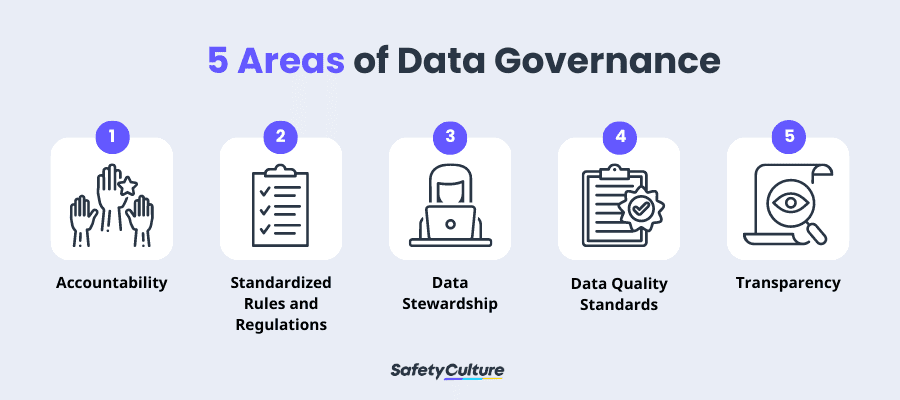What is Data Governance?
In a world where data is becoming increasingly important, businesses must develop ways to manage and protect their data effectively. Data governance is one such way. Data governance protects and manages data to ensure its accuracy, quality, and security. It includes developing policies and procedures for collecting, storing, and using data. It also involves establishing roles and responsibilities for those who work with data.
By implementing data governance, businesses can ensure that their data is reliable and secure. In turn, this can improve decision-making and reduce risk. As such, data governance is essential to any business that relies on data.
Data Governance vs. Data Management
Data governance and data management are two terms that are often used interchangeably. However, they refer to two different concepts.
Data governance ensures that data is accurate, complete, and compliant with internal and external regulations. On the other hand, data management is the process of planning, specifying, controlling, storing, retrieving, organizing, and manipulating data. While data governance is concerned with data quality, data management is concerned with its quantity and structure.
Benefits
Data governance can bring numerous benefits to businesses. Among them are:
- Create Better and Timely Decisions – Users in your organization can get the data they need to help customers, improve products and services, and find new ways to make money.
- Improve Cost Controls – Duplicate information is costly. So, by getting rid of data duplication, you can save money.
- Ensure Regulatory Compliance – Organizations need to have good data governance practices. It’ll help them avoid risks associated with not following rules and prepare them for new regulations.
- Increase Customer and Supplier Trust – If you follow internal and external data policies, people will trust that you will protect their sensitive information. It’ll make them feel good about doing business with you.
- Manage Risks More Effectively – Strong governance will ensure that unauthorized people do not access sensitive data. It could include someone outside the company trying to steal data or someone inside the company not supposed to see it.
- Make Data More Accessible – Strong data governance means that more people in the organization can access data. It includes getting access to the correct data and ensuring that it does not negatively impact the organization.
4 Pillars
The four pillars of data governance are as follows:
Identify Distinct Use Cases
It’s crucial to relate data governance to its impact on an organization by considering revenue, cost, and risk, explaining how it will be helpful to get stakeholders involved, and part of creating a framework. By applying your stakeholders in the project planning process, you help ensure that relevant issues are being addressed and get buy-in for the project. This commitment to success from key individuals helps guarantee the overall success of the venture.
Quantify Value
The success of data governance depends on its ability to be measured. Gauging the impact of data governance should be possible in each use case and for the organization as a whole. The success of a data governance framework depends on setting and tracking Key Performance Indicators (KPIs). It’ll also help reveal any areas that need more focus or improvement.
Improve Data Capabilities
A good data governance framework will improve the usefulness of data for all users and outline processes to get the most out of available data. It includes having the right technology in place so users can access and use data per set requirements (e.g., via outlined use cases). Some of the most common capabilities are:
- Facilitating collaboration across the organization to share data assets
- Maintaining compliance with internal and external regulatory requirements
- Including a searchable and intuitive catalog for discovering data assets
- Enforcing data protection by implementing least-privilege data access
- Ensuring data accuracy
- Learning how the data was collected, classified, and used
Develop a Scalable Delivery Model
The data governance framework becomes easier to establish by addressing more use cases and delivering more benefits. By doing this, the time needed to address each new use case effectively decreases while also providing a higher return on investment. An organization can eventually implement a data governance framework.
5 Areas of Data Governance

5 Areas of Data Governance | SafetyCulture
Accountability
Any data governance process will only succeed with a clear sense of ownership and accountability. Diligence in this area ensures that your organization’s data is well-managed and protected. Furthermore, everyone in the organization must buy into this system to be truly effective.
To ensure accountability throughout the organization, you should establish a data governance council with members from every department, including executives. The newly established data governance council will define and implement company-wide procedures and policies related to data across the organization, with the power to enforce them.
Standardized Rules and Regulations
Data governance is a complex but critical process for any organization that collects and stores data. Standardized rules and regulations must be established and followed to protect this data and ensure it’s used appropriately. These guidelines should cover all aspects of data usage, from collection to storage to destruction. They will be created by the data governance council, with input from the appointed data stewards.
Data Stewardship
Once you have instilled accountability in your organization, the next step is responsibility. To ensure the right people are responsible for your data, appoint a dedicated data steward. Individuals in this position report to the data council and are responsible for implementing and enforcing the rules and regulations defined by it.
Data Quality Standards
While data plays a significant role in many business decisions, not all data is created equal. Most companies can’t even trust the information they have on hand. To ensure your company’s data is top-notch, the data governance board should create a reliable set of quality standards with help from the data steward. It’ll ensure that everyone within your organization understands and adheres to your data quality standards.
Transparency
Data governance processes within your organization must maintain transparency. Third-party audits can reveal the handling of sensitive data, the reason for its usage, and its purpose. Data transparency will safeguard your company in the event of a data breach and enable you to keep learning how data is used within your business.
Concerns for Governing Data in the Cloud
Data Security
Although storing data in the public cloud is a concern for businesses, they should know that their provider will take measures to protect against exposure or theft.
Create Your Own Data Security Checklist
Eliminate manual tasks and streamline your operations.
Get started for FREERegulation Compliance of Cloud Vendors
Enterprise compliance officers who ensure that their company follows regulations and standards must trust that their cloud vendor will do the same. They also need the vendor’s help to ensure that their data stored on a server not belonging to them complies with guidelines such as:
- General Data Protection Regulation (GDPR)
- California Consumer Privacy Act (CCPA)
- Payment Card Industry Data Security Standard (PCI DSS)
- Health Insurance Portability and Accountability Act (HIPAA)
Control and Visibility for Data Owners
Cloud service providers know that data governance is essential to gaining customer trust and providing a positive customer experience. Therefore, many leading vendors offer tools for data assessment, metadata cataloging, access control management, information security, etc., as part of their platform’s capabilities.
FAQs About Data Governance
Data Stewardship
It includes setting policies and guidelines to ensure that data is secure and accurate and regularly monitoring data usage.
Data Quality
It encourages activities and techniques which promote accuracy, completeness, consistency, timeliness, validity, and uniqueness. It helps prevent errors and ensure that data is as accurate and reliable as possible.
Data Management
Data management is the understanding, categorizing, storing, securing, and analyzing of data. Managing enterprise data is crucial because it allows businesses to see how they can reduce costs while increasing efficiency and security.
A data governance framework includes discovering data to create a unified view across the enterprise. It has the data itself and data relationships and lineage, technical and enterprise metadata, data profiling, data certification, data classification, and collaboration.
- Data Owners – Data owners are the ones in control of decisions about data and ensure that these decisions are delivered throughout the company. In other words, they’re held accountable for the data’s usefulness as an asset.
- Data Stewards – These are the people who ensure that data policies and standards are followed in daily business. Data stewards either take care of data as an asset or guide how to do so.
- Data Custodians – You may use data custodians (or data operators, whichever you prefer) to help with the business and technical aspects of onboarding your data assets, maintaining them, and making end-of-life updates.
- Data Governance Committee – The data governance committee will act as the authoritative body to approve data policies and standards and address any issues that require escalation.
Generally, data governance consists of establishing guidelines for the use, retention, and security of data within an organization. It might involve defining data models, distributing roles and responsibilities regarding the use of data, or creating standards for data handling.




